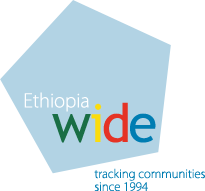Gara Godo, Wolayitta
Gara Godo in 2011
Gara Godo is a mostly flat densely-settled highland kebele with a recently established municipality at its centre. There are 1248 households in three sub-kebeles, 22% female-headed. It is 12 kms on a recently-upgraded all-weather road to Areka the wereda town; there are buses three times a week. It is 28 kms on an asphalted road from Areka to Wolayita Sodo the zone capital. All residents are Wolayitan; 60% are Protestants in five sects, 36% Orthodox Christian and 4% Catholic. There are more than 25 clans divided into 130 lineages. Houses abut the farms which ideally have a home garden for coffee, root crops, vegetables and spices, family grazing land with eucalyptus, and a main field for maize, boloke, and tef. 34% of households are landless and many have plots of less than ¼ hectare and no grazing land or field.
The area is becoming hotter and rain patterns changing. There is no irrigation. Drought caused deaths of people and livestock in 2008 and 2011; emergency food aid and the veterinary service were inadequate. There are regular water shortages in dry seasons and while many households lack food in the hungry season only 11% are PSNP beneficiaries. The major livelihood activities are crop production, animal husbandry, Cash/Food-for-Work, agricultural labour, trade, non-farm businesses in the town and seasonal migration. Coffee is the biggest source of cash, followed by tef and maize. Due to rising prices, improved seeds and seedlings, fertiliser, new farming techniques, oxen-fattening, an increasing focus on cash crops, more trading and agricultural daily labour, and business and employment opportunities in the growing town, the economy has experienced growth despite two major droughts. There are two coffee-shelling plants employing 150 or so people seasonally. A third of male youth migrate for seasonal work on large private farms and youth of both sexes migrate to towns. Government contributions to growth include road access, electricity, mobile phones, improved seeds and fertiliser for selected crops, credit, and PSNP. The community has accumulated 700,000 birr of debt over the last two years. Service, youth and a women’s co-operative have not performed well. Young people successfully establishing small businesses are doing it independently.
Investments in health and education services are slowly changing attitudes, behaviour and wellbeing. Malaria significantly affects work though health extension preventive activities are said to have reduced it. Co-operation with health extension workers was higher on malaria prevention, latrines, vaccination and family planning. Because of stigma PLWHAs try to keep their condition secret; there have been three known deaths and two people get ART from the health centre. There is education up to Grade 10 in the kebele; the preparatory school is in Areka. Poor households cannot afford to use it or post-secondary education, the Health Centre, private clinics, or hospitals. Around 10% of households are ‘very rich’ while more than half are poor.
Young people and adults combine work and education in various ways. Young people and children are not following old ways of thinking; they get information via TV and internet sources downloaded to mobile phones. Abduction has reduced and girls can decide when and who to marry; underage marriage is common for those not in education. Young men are marrying later. Women’s lives are changing. They can cultivate farmland, participate in trade, daily labour, construction and government work, spend money as they wish, and borrow from OMO MFI. Some are politically active, and there are good role models like the school director. Many women are aware of their property rights but elders and officials are not keen to implement them.
Government and party structures are increasingly inter-twined but there are only 272 party members. Most people do not want to spend time doing the many unpaid development/party leaderships jobs at kebele, development team/cell, and 1-5 levels, especially in peak seasons, but the EPRDF is appreciated for interventions in education, health, infrastructure development and peace and good governance. Youth and women’s organisations are very weak.
Gara Godo in 1995
Gara Godo in late 2011
Download PDF
